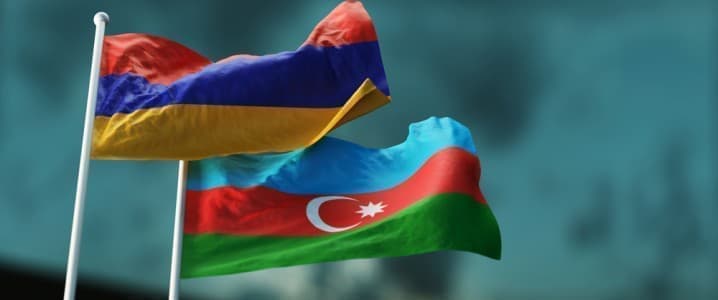Armenia and Azerbaijan engaged in legal battles as they try to make peace

Armenia and Azerbaijan are engaged in a convoluted peace process in the Caucasus, but are still embroiled in a bitter battle in The Hague.
Over the course of several days of hearings in mid-April, the United Nations International Court of Justice (ICJ), based at the headquarters of the Dutch government, assessed the merits of a motion by Azerbaijan arguing that the ICJ has not jurisdiction over a three-year-old lawsuit brought by Armenia.
The lawsuit calls for Azerbaijan to be tried for a series of war crimes, including fomenting hatred towards Armenians that led to numerous murders and the systematic attempt to erase vestiges of Armenian culture in Nagorno-Karabakh, which Baku recaptured last year. The takeover resulted in the mass expulsion of over 100,000 Karabakh Armenians from the territory.
In urging the Court to proceed with the case, Armenia's agent to the ICJ, Yeghishe Kirakosyan, characterized Azerbaijan's aggression as a racially motivated attack. “There is no better example of racial discrimination, disturbing peace and security, than Azerbaijan's recent armed aggression, which led to the ethnic cleansing of the entire Nagorno-Karabakh,” Kirakosyan said on April 16.
A day earlier, Azerbaijan requested dismissal , arguing that the case did not fall within the ICJ's mandate, citing a technicality.
Shortly after Armenia submitted its case to the ICJ in 2021, Azerbaijan filed a similar case against Yerevan. It could take years for these cases to proceed at the ICJ. Meanwhile, the court has issued several injunctions, including a ruling issued last fall that said Armenian refugees who had been cleared from Karabakh had the right to return “safely, unhindered and expeditiously” if they so desired. .
In a separate development, a California-based rights advocacy group filed a petition with the International Criminal Court (ICC), also based in The Hague, on April 18 documenting Azerbaijan's war crimes in Karabakh , according to a report from the Associated Press. Baku officials did not give an initial response to the request.
The petition calls on the ICC to launch an investigation into the conduct of Azerbaijani citizens during the Karabakh conflict. Armenia became a state party to the ICC in early 2024, after ratifying the Rome Statute, the document that established the court. The International Criminal Court and the International Court of Justice are distinct legal forums: the International Court of Justice has a broader mandate to deal with interstate legal disputes, while the International Criminal Court tries individuals, not states, in cases of crimes of war.
The recent legal maneuvers in The Hague come a month after Armenian Prime Minister Nikol Pashinyan launched an arthouse balloon, probing the possibility of both sides dropping their respective cases. During a press conference on March 12, Pashinyan questioned the usefulness of continuing with legal disputes once the two sides have reached a comprehensive peace agreement. The lawsuits could be stopped as a final component of any peace deal, he suggested.
The possibility of abandoning efforts to achieve historical justice has sparked reactions from several directions in Yerevan, uniting disparate segments of society against such an idea. Critics see it as another unilateral concession by the government, hot on the heels of Pashinyan's offer to unconditionally return four disputed villages to Azerbaijan to speed up the conclusion of a peace deal. “It's pro-Azerbaijan again,” said Artak Beglaryan, a former high-level official of the de facto Nagorno-Karabakh Republic, who no longer exists. “It is important to understand that these complaints from Azerbaijan [in The Hague] are baseless, unlike the Armenian lawsuits. Baku filed a lawsuit to use it as an object of political bargaining.”
Armenian human rights advocates also tried to shoot down Pashinyan's test balloon. Over 40 Armenian non-governmental organizations released a statement describing the International Court of Justice trial as crucial to holding Azerbaijan accountable for human rights violations and crimes committed against Armenians. Stopping the Hague proceedings would undermine efforts to achieve justice for past victims and prevent future crimes.
Yerevan will have to find a way to avoid the continuation of legal cases with the need to guarantee justice for the parties who suffered injustice and violence in the recent conflict which led to the loss of Nagorno Karabakh. One way might be to pursue individual cases of violations of the law by assisting the injured parties, but stopping them at the state level. Or, simply, separate the peace process from the persecution of crimes committed by individuals.
However, Armenia will not be able to forget its fellow citizens driven from their lands.

Thanks to our Telegram channel you can stay updated on the publication of new Economic Scenarios articles.
The article Armenia and Azerbaijan opposed by legal battles, while trying to make peace comes from Economic Scenarios .
This is a machine translation of a post published on Scenari Economici at the URL https://scenarieconomici.it/armenia-e-azerbaigian-opposti-da-battaglie-giuridiche-mentre-cercano-di-fare-la-pace/ on Tue, 23 Apr 2024 06:00:59 +0000.
